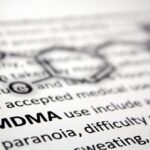Many people who struggle with alcohol dependency, alcohol use disorder (AUD), or other forms of problem drinking may not be fully aware of the long-term damaging effects that alcohol has on their bodies. In addition to the toxic effect of alcohol, nutritional deficiencies often occur that can have serious and lasting results.
Nutritional Deficiencies
Both vitamins and minerals are essential to a person’s emotional and mental well-being. Vitamins are needed to maintain normal metabolism and growth as they regulate the functions of the body.
When an individual drinks alcohol, their body cannot absorb and use the vital nutrients it needs—including the group of vitamins that make up B-complex, Vitamin A, C, D, and K. The body is also deprived of the benefits of minerals including calcium, magnesium, potassium, iron, and zinc.
B-Complex Vitamins
- Vitamin B1 (thiamine) – Deficiencies in this vitamin can cause irritability, depression, and neurological, and/or cardiac disorders.
- Vitamin B2 (riboflavin) – This vitamin deficiency can cause depression.
- Vitamin B3 (niacin) – An insufficient amount of niacin results in extreme fatigue, anxiety, apprehension, and depression.
- Vitamin B6 (pyridoxine) – Deficiencies of this vitamin can cause the disruption of the formation of neurotransmitters in the brain.
- Vitamin B12 – Depression will result from a deficiency.
- Folic Acid (a synthetic form of vitamin B12) – A deficiency is a common cause of depression.
- Pantothenic Acid (called Vitamin B5) – Deficiencies can result in chronic stress, extreme fatigue, and depression.
Other Vitamins
- Vitamin A – A deficiency is linked to night blindness.
- Vitamin D – Softening of the bones can result from insufficient amounts.
- Vitamin C – A deficiency can result in chronic fatigue and depression.
- Vitamin K – Insufficient amounts cause delayed blood clotting and excessive bleeding.
Minerals
- Calcium – The central nervous system is affected by a lack of calcium.
- Magnesium – A deficiency results in weakness, confusion, apathy, loss of appetite, and insomnia.
- Iron – Chronic iron deficiency leads to depression.
- Zinc – Depleted amounts result in apathy, lethargy, and loss of appetite.
- Potassium – Tearfulness, depression, weakness, and fatigue occur when this mineral is depleted.
- Manganese – This mineral is needed for the body to use Vitamin C and the B-complex vitamins.
- Chromium – A deficiency and can hypoglycemia as it helps glucose travel to the cells.
- Omega 3 EFA – Anemia and skin disorders result if there is a deficiency of EFA.
More About the Dangers of a Vitamin B1 Deficiency
Symptoms commonly associated with alcoholism, such as impaired cognitive thinking, poor memory, and depression are caused by nutritional deficiencies, especially B-complex vitamins. These deficiencies also cause many other common symptoms including dizziness, shakiness, tremors, insomnia, and anxiety.
However, a deficiency of Vitamin B1 (thiamine), which is part of the B-complex vitamins, can lead to a devastating result. Thiamine is needed for the production of enzymes that produce neurotransmitters, which are specific brain chemicals. When there is a thiamine deficiency, the neurotransmitters are unable to function properly—resulting in the formation of harmful reactive oxygen molecules known as free radicals. When this occurs, the person’s brain is affected in ways that result in severe cognitive and memory impairment.
Wernicke-Korsakoff Syndrome – One of the Most Serious Results of Vitamin B1 Deficiency
An article published by the National Institute on Alcohol Abuse and Alcoholism (NIH) called “The Role of Thiamine Deficiency in Alcoholic Brain Disease” explains the many different types of brain injuries that can result from a thiamine deficiency. The brain injuries vary in severity of cognitive brain functions with the worst being alcohol induced persisting dementia, also called alcoholic dementia.
Wernicke-Korsakoff Syndrome (WKS) is described in an NIH article titled “Alcohol’s Damaging Effects on the Brain.” WKS is made up of two separate syndromes.
- Wernicke’s encephalopathy, a severe short-lived condition, includes mental confusion, paralysis of the nerves that move the eyes, and difficulty with muscle coordination. A person at this stage may be unable to walk or may be too confused to find their way out of a room.
- Korsakoff’s psychosis, a long-lasting and debilitating condition, is a late complication of Wernicke’s encephalopathy.
Together the two syndromes have many symptoms.
- Memory loss with or without confabulation (when a person makes up stories to fill the blanks of their loss of memory and insists they are true)
- Partial or total loss of muscle coordination
- Difficulty swallowing
- Extreme confusion
- Difficulty speaking or speech impediments
- Hallucinations
- Blindness or dramatic vision changes
- Inability to speak in a way that makes sense
Help Is Available
If you or a loved one are suffering from an alcohol or drug addiction, there is help available. Call and speak to a professional at Canyon Vista Recovery Center in Mesa, Arizona to begin the journey to a happy, healthy, and sober life.
Learn more about programs offered at Canyon Vista Recovery Center, Mesa alcohol rehab.
Contact us at (888) 979-1840
Resources
- National Institute on Alcohol Abuse and Alcoholism – Alcohol’s Damaging Effects on the Brain
- National Institute on Alcohol Abuse and Alcoholism – The Role of Thiamine Deficiency in Alcoholic Brain Disease
- National Institute on Alcohol Abuse and Alcoholism – Alcohol Alert
- Boulder Medical Center – Nutrition Recommendations for Those Who Consume Alcohol
- Up To Date – Nutritional Status of Patients with Sustained Heavy Alcohol Use





